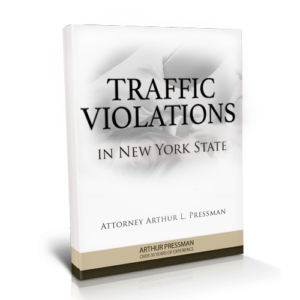 Your Ticket to Justice
Your Ticket to Justice
The New York State Traffic Violations Guide was created to help people who were given traffic tickets while driving or parked in a motor vehicle.
When you are issued a traffic ticket by a police officer, your first instinct may be to mail it in and plead guilty. However, this costs points on your license, time, and money.
Traffic penalties cost more these days than just the cost of the ticket. Per a recent analysis by insurance.com, a reckless driving charge boosts insurance premiums by 22 percent on average, for example, while driving without a license adds 18 percent. And higher rates can stay in place for as many as seven years. The average premium increase due to a reckless driving charge is $550 per year. Potential costs over seven years can equal $3,850. This alone should give you reason to fight a traffic penalty charge before just paying it.
In the state of New York, you could be charged with the following traffic violations:
- Speeding
- Overdue parking meter
- Not using a turn signal
- Parking in a handicapped zone without authorization
- Making obscene gestures and over-aggressive driving
- Improper stopping at a stop sign
- Improper yielding to a yellow light
- Cutting off another vehicle
Points on Your License Cause Insurance Rates to Rise
A moving violation, such as a speeding ticket or leaving the scene of a property damage accident, can carry serious penalties. In addition to the fine, your insurance may increase due to points being added to your license. Your driver license could even be suspended or revoked if you exceed 11 points or are convicted of three speeding violations in 18 months.
This table lists the number of points given for specific traffic violations:
| Violation | Points |
| Speeding (mph over speed limit): | |
| 1 – 10 mph | 3 |
| 11 – 20 mph | 4 |
| 21 – 30 mph | 6 |
| 31 – 40 mph | 8 |
| More than 40 mph | 11 |
| Speeding (mph over speed limit not indicated) | 3 |
| Reckless driving | 5 |
| Failing to stop for a school bus | 5 |
| Inadequate brakes | 4 |
| Following too closely | 4 |
| Passing improperly, changing lanes unsafely, driving to the left of center, driving in the wrong direction | 3 |
| Failing to obey a traffic signal, a stop sign, or a yield sign | 3 |
| Railroad crossing violation | 3 |
| Failing to yield the right-of-way | 3 |
| Passenger safety violation, including seat belt and child safety seat violations for passengers under the age of 16 | 3 |
| Leaving the scene of an accident that includes property damage or the injury of a domestic animal | 3 |
| Other moving violations | 2 |
| Inadequate brakes (vehicle of an employer) | 2 |
Will Hiring an Attorney Save Me Money on a Traffic Ticket?
The answer is yes. An attorney can negotiate a reduced plea on a traffic matter which will save them fine money. Secondly, an attorney can, in most cases, arrange that you do not have to appear at a driving school. This will save you money, as well. Thirdly, when an attorney negotiates a plea to reduction in charges, it will save you money on your insurance, and fourthly it will save you the inconvenience of spending two or three hours in court. For most people, time is money.
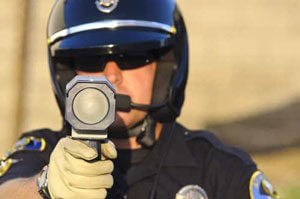 Speeding
Speeding
Speeding is a traffic offense in New York. A speeding ticket is costly and can cause your insurance premiums to go up based on the accumulation of points on your license. In addition, if your insurance company considers you high risk because of excessive tickets, your insurance is dropped completely. Getting a ticket doesn’t mean you’re guilty of speeding.
Means of determining speeding in NY
A variety of different methods and forms of technology are used to measure the speed of a vehicle. Some of the most common methods of determining the charge are with the following devices:
- Lasers: A laser is aimed at the targeted vehicle and the time/distance is measured. Lasers can pinpoint specific vehicles in congested traffic.
- Radar guns: Radar guns aim an electromagnetic signal to determine the speed of a vehicle. An officer who uses the radar device has to be certain it is not picking up objects that may be in the targeted zone and cause interference.
- Clock and pace method: An officer moves his vehicle behind another vehicle, keeping a uniform pace between the two vehicles for a certain time using the speedometer to measure the overall speed.
- Speed cameras: In New York, a speed radar camera is used to trigger a camera to photograph vehicles traveling faster than a set speed. This type of device also captures the specific time, location, and speed.
- Aerial speed devices: Police in New York measure vehicle speeds by aircraft by monitoring the time it takes the target to travel between two marked spots. They then signal to ground officers who issue the speeding violation.
NY speeding tickets can be costly
The following tables list the schedule for speeding fines and points on your license if you are convicted of speeding in New York:
| New York Vehicle and Traffic Law Violation | Maximum Fine | Court Surcharge |
| 1180 (a) Speed not reasonable and prudent | 150 | $80-$85 |
| 1180 (b) Speed over state limit | ||
| >10 miles per hour (mph) over limit | 150 | $80-$85 |
| 11-30 mph over limit | 300 | $80-$85 |
| <31 mph over limit | 600 | $80-$85 |
| 1180 (c) Speeding in school zone (between 6:00 p.m. and 7:00 a.m. and non-school days) | ||
| >10 mph over limit | 150 | $80-$85 |
| 11-30 mph over limit | 300 | $80-$85 |
| <31 mph over limit | 600 | $80-$85 |
| 1180 (c) Speeding in school zone on school days | ||
| >10 mph over limit | 300 | $80-$85 |
| 11-30 mph over limit | 600 | $80-$85 |
| <31 mph over limit | 1200 | $80-$85 |
| 1180 (d) Speeding in zone | ||
| >10 mph over limit | 150 | $80-$85 |
| 11-30 mph over limit | 300 | $80-$85 |
| <31 mph over limit | 600 | $80-$85 |
| 1180 (d) Speeding on a restricted highway | ||
| >10 mph over limit | 150 | $80-$85 |
| 11-30 mph over limit | 300 | $80-$85 |
| <31 mph over limit | 600 | $80-$85 |
| 1180 (c) Failure to reduce speed for vehicles with special hazards | 150 | $80-$85 |
| 1180 (f) Speeding in a construction zone | ||
| >10 mph over limit | 150 | $80-$85 |
| 11-30 mph over limit | 300 | $80-$85 |
| <31 mph over limit | 600 | $80-$85 |
| 1180 (g) Vehicles greater than 18,000 lbs speeding detected using radar | ||
| >10 mph over limit | 150 | $80-$85 |
| 11-30 mph over limit | 300 | $80-$85 |
| <31 mph over limit | 600 | $80-$85 |
| 1181 (a) Driving too slow impeding traffic | 150 | $80-$85 |
| 1181 (b) Driving below minimum posted speed limit | 150 | $80-$85 |
| 1182 (1) Unauthorized speed contest (racing) | 525 | $80-$85 |
How do the Police Measure Speed?
If you’ve been ticketed for speeding in New York State, you’ve probably researched the fine, the penalty points and the requirements for traffic school and concluded that breaking the speed limit “just isn’t worth it!” Although you don’t get to “do it all over again,” you can help yourself immensely by hiring an attorney who has experience challenging the State Police in their use of radar and lidar.
New York State Troopers use two devices to measure vehicle speed: Stalker DSR units and LTI Ultralyte LR B devices. These are precise instruments, which require very little on the part of an operator to get an accurate reading. However, they are not perfect and, if you know what you’re doing, it is possible to challenge this evidence in court and get a dismissal of the ticket or a reduction in the charge.
Stalker Directional Sensing Radar employs a ground-breaking technology that allows the radar unit to detect the speed of an approaching or withdrawing object while the unit is stationary or moving. The trooper can use the unit while parked on the roadside or in pursuit, without having to adjust the unit. A trooper monitoring approaching traffic need not worry that the device will pick up readings from traffic going the opposite direction.
The LTI Ultralyte LR B is a pinpoint laser device that works extremely well in multi-lane traffic. The device sends out a beam of light then reads the speed when it bounces back from a moving object. The beam is only three feet wide at 1,000 feet of distance, allowing officers to validate the speed of a single vehicle, even in tight traffic. Yet, there may be grounds for you to question the accuracy of the reading:
- When was the last time the device underwent maintenance?
- Was there “an even faster car” that passed you around the time you were pulled over?
- Does your EZ Pass record put you at a time and place that contradicts the speeding allegation?
- Did the officer correctly fill out the citation?
- Does your driving record give a judge cause to be lenient?
When you retain an attorney to manage your speeding ticket, you benefit from knowledge and experience that could make all the difference in your case.
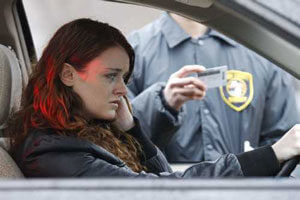 Suspended License
Suspended License
What is license suspension and revocation?
Suspension is having your license taken away for a period before it is returned to you. You may be required to pay a suspension termination fee to get it back. Revocation is more severe. It means that your license has been voided. Revocation terminates your license indefinitely or for a specified amount of time. Once the revocation period is over, you must re-apply to the Department of Motor Vehicles (DMV) to obtain a new license and pay a license re-application fee. Your application may be denied if you have a bad driving record or fail to meet other DMV requirements. New York State considers it a criminal misdemeanor offense, which means that if you are convicted of driving on a suspended license, you will have a criminal conviction. This will not go away. This will stay with you the rest of your life. It is important that you have an attorney at every stage of appearing in front of a judge on a suspended license.
Causes for a license suspension or revocation in New York
In the state of New York, your license can be suspended or revoked for a host of reasons. Some include the following:
- Accumulation of points: If your driving record accumulates 11 or more points within an 18-month period, you may face suspension by either the DMV or a judge.
- Failure to answer a traffic summons: When a traffic summons is given, failure to respond within the time limit can result in a revoked or suspended license.
- Failure to pay fines: If you refuse to pay mandatory fees, such as surcharges, suspension-termination fees or crime victim assistance program fees, your license may be suspended or revoked.
- Payment with a bad check: Submission of a bad check to the DMV is cause for suspension in New York.
- Driving while ability impaired by a drug (other than alcohol) (DWAI-Drug): This results in an automatic six-month license suspension.
- Driving while ability-impaired by alcohol (DWAI-Alcohol): This results in an automatic 90-day license suspension.
- Revocation is mandatory in the following situations:
- DWAI committed within five years of any previous DWAI: Six-month revocation
- Driving while intoxicated (DWI): Six-month revocation
- Three speeding violations committed within 18 months: Six-month revocation
- Leaving the scene of a fatal or personal injury accident: Six-month revocation
- Refusal to submit to a chemical test: One-year revocation
- Conviction for uninsured operation or permitting uninsured operation: One-year revocation
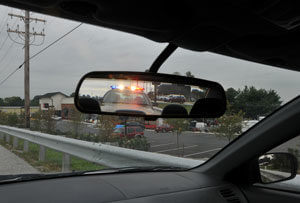 Leaving the Scene of an Accident
Leaving the Scene of an Accident
Leaving the scene of an accident where property damage occurred
New York code VTL 600(1) indicates that if a driver involved in an auto accident knows, or has reason to know, that property damage has occurred, the driver is required to stay at the scene of the accident to provide all the following:
- Driver license
- Proof of insurance
- Driver’s name and address, insurance carrier and driver license number to the other party
If you left the scene of an accident or have been ticketed for such, you can be fined up to $250 and face possible jail time of up to 15 days. In addition, at-fault drivers receive three points on their license.
If you are a commercial driver and leave the scene of an accident, you run the risk of having your license revoked for one year.
Leaving the scene of an accident where personal injury occurred
New York state law says that if a driver is involved in an accident and knows or has reason to know that personal injury to another has occurred, the driver must stop at the scene and provide license and insurance information. Failure to do so could result in your being charged with a felony or misdemeanor. Subsequent violations are considered a Class A misdemeanor, followed by a Class E felony.
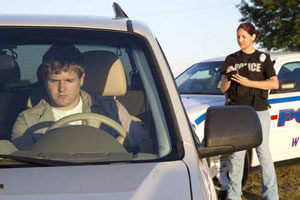 Driving Without Insurance
Driving Without Insurance
New York law requires that every vehicle driven on a public road must carry liability insurance. As the insured, you must be able to provide confirmation of coverage. If you fail to comply, you run the risk of being ticketed or arrested and your vehicle being impounded by the police. In addition, the Department of Motor Vehicles (DMV) may suspend your registration, requiring you to turn in your license plate.
New York auto insurance requirements
New York has very specific insurance laws regarding the operation of a vehicle. Insurance must be issued and company licensed by the New York State Department of Financial Services. The registration and insurance must be listed under both the same name and the same address. The minimum insurance requirements are as follows:
- $25,000 bodily liability maximum for one person injured in an accident
- $50,000 bodily injury liability maximum per incident
- $10,000 property damage liability maximum for one accident
Penalties for driving without insurance in NY
New York has established minimum insurance requirements to operate a vehicle. If you have failed to maintain insurance coverage on your vehicle, you can be subject to receive a citation from a police officer and the potential of financial loss if an accident has occurred. Driving without the minimum insurance in NY is a criminal offense carrying the following serious consequences:
- Citations
- Driver license suspension up to a maximum of three years
- Suspension of vehicle registration
- Excessive fines
Liability of drivers without insurance if they allow others to drive their uninsured vehicle
Letting someone borrow your vehicle is a common occurrence. However, know that if you do, you assume liability for that person. If you do not have the required insurance and the person is in an accident, you may be held liable.
New York law states that vehicle owners are liable whether they drive their vehicle or allow others to drive. The penalty is loss of your driver license for at least one year ― the same penalty if you were the one who had the accident while uninsured. In addition, you may need to pay in full many other fines, fees, and costs, often as high as $1,500, prior to applying for a new license.
Insurance Lapse Violations
If you are charged with an insurance lapse violation in New York State, the penalties can be quite severe. Not only do you face charges in a traffic or criminal court, there are additional penalties that DMV may impose for the insurance lapse. DMV typically will impose a fine of $8 a day for the first 30 days of an insurance lapse. Between 31 and 60 days, DMV will impose a fine of $10 a day for each day, and if your lapse goes between 61 and 90 days, DMV will impose a fine of $12 a day. In addition to that, your license could be suspended or revoked based on the period of the insurance lapse.
What Is the Difference Between Driving Without A License And Driving With A Suspended License?
In New York, driving without a license typically means that you’ve not been issued a license, and you are driving without one. Driving on a suspended license is a very different charge. That is a criminal traffic misdemeanor in New York State, and in most cases, your license has been suspended for failing to pay traffic fines or tickets in other localities.
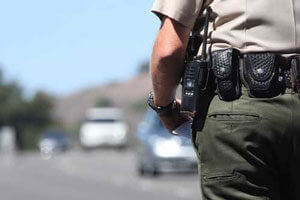 Reckless Driving
Reckless Driving
Reckless driving is an unclassified misdemeanor offense in New York State, and, if convicted, you can face the following:
- Up to five points on your driver license
- A possible increase in your auto insurance
- A criminal record
Penalties for reckless driving
Reckless driving is a serious charge that results in a criminal record if convicted. A conviction for reckless driving results in five points on your driving record, which significantly increases your insurance premiums. You may also receive fines of $100–$300, plus a fee of $70 for first-time offenders. In New York, your driving privileges may be suspended if you receive 11 points in an 18-month period.
Reckless driving is rather subjective and serves as a catch-all for many different driving infractions such as the following:
- Talking on a cell phone
- Texting while driving
- Using any mobile device
- Eating or drinking
Because reckless driving is considered a criminal offense, many district attorneys require a court appearance and do not allow you to handle the offense via mail. This makes fighting a charge of reckless driving even more challenging. Judges are generally less flexible when negotiating a criminal reckless driving case, which is why you need an aggressive defense lawyer to represent you.
Your Attorney should aggressively fight to:
- Reduce or eliminate the points on your driver license
- Protect your driver license
- Avoid jail time, fines and court costs
- Completely dismiss the charges
If you have been given a traffic ticket and are ready to fight it, contact Arthur Pressman, an experienced Traffic Violations Attorney in Buffalo NY.
